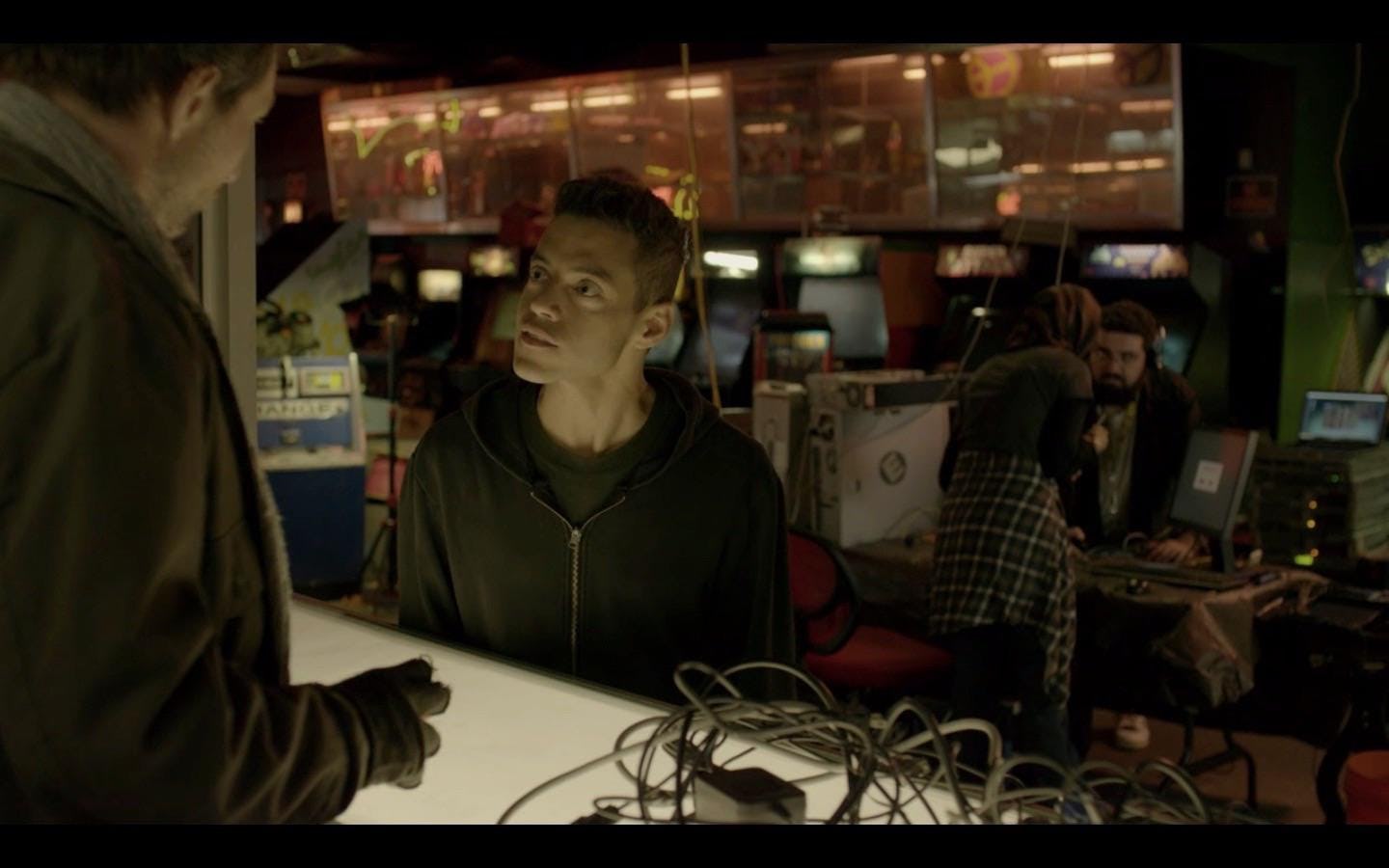
It seems like there’s a resistance to expanding our conception of cyberpunk beyond the (admittedly iconic, but perhaps narrow) pop culture aesthetic of a hardboiled pink-purple speculative future, one of brutalist neon megacities and three-dimensional Metaverses waiting to be “jacked” into. But that’s a shame, because the very tangible world of the here-and-now resembles and subverts what artists like Katsuhiro Otomo and William Gibson were envisioning in the ‘80s in startling ways. The tech dystopia presented by the subgenre feels increasingly of a frustratingly banal present. But 10 years ago, another artist threw his hat in with those early architects, deconstructing the genre through a wholly contemporary lens — and introducing audiences to television’s most sardonic, unpredictably tortured millennial antihero in the process.
Much to the chagrin of real-life hackers and information security employees everywhere, cybersecurity had mostly been portrayed as some three-dimensional reality of esoteric, incomprehensible digital knowledge prior to Mr. Robot. Thankfully, showrunner Sam Esmail’s lifelong hyperfixation on hacker culture smashed headfirst into the revolutionary political momentum cultivated on early 2010s social media (in particular the 2011 Egyptian revolution, an event he had a personal attachment to because of his own heritage). The end result became one of the most authentic and expert-celebrated depictions of cybersecurity and hacking ever. It’s cut of the same nervy, disaffected, paranoid online cloth as David Fincher’s The Social Network, and it’s certainly not the only DNA it shares with the filmmaker.
Our lovably misanthropic guide into this new world is Elliot Alderson (the role that thrust Rami Malek’s soul-piercing eyes into the spotlight), a cybersecurity engineer by day and cyber-vigilante by night who receives his golden ticket from the vagrant Willy Wonka he meets on the subway, the titular enigmatic Mister played by Christian Slater, who leads a team of anarchist hackers named fsociety.
Not only did Mr. Robot kind of wholly rewrite the cinematic language of digital screens for television (presenting them with the kind of mundane, invasive ubiquity that has consumed our lives), but it did it at what felt like such a crucial precipice in the timeline for our relationship with the internet and technology. The pilot premiered nine years after Facebook went public; it was two years post-Snowden’s NSA leaks, and just a year after the Sony Pictures hack. The pilot was such a lightning rod for our unconscious online anxieties that it featured a subplot about Elliot hacking a serial adulterer using escort sites just a month before the infamous Ashley Madison hack in July of 2015. It was as if the world at large suddenly fell violently out of the honeymoon phase with Silicon Valley and cyberspace and began wondering collectively who they had married. And after looking at the ten years since the show’s premiere, it feels foolish that we could’ve ever been so naive.
Neither Elliot nor fsociety are simply aggrieved, directionless hackers though, and naturally they have much higher aims than cheaters or the studio behind The Interview. We inevitably discover that Elliot has been recruited to hack the fictional E-Corp, the largest conglomerate in the world, with the express purpose of encrypting (and therefore erasing) their financial debt records. It’s the Robin Hood-styled principled chaos that draws such an obvious parallel to Anonymous, but it’s also another piece of art from over a decade ago where the writing was so plainly on the wall. Ten years ago, the wealth inequality gap in America was already so bad that a cybersecurity engineer who could afford a one-bedroom apartment in New York City was contemplating committing numerous federal crimes over it, and it has only demonstrably gotten worse, in part due to the prevalence of explicit political corruption driven by the same tech billionaires who have cultivated our current environment. It’s absolutely the kind of economic enslavement and mass labor exploitation alluded and expanded upon in stories like Neuromancer or Blade Runner or even The Matrix in a wildly allegorical sense, and yet Mr. Robot makes it feel just as ridiculous and chilling without it ever feeling beyond the realm of reality.

Of course, if Elliot is a superhero of a sort — a millennial savior seeking to deliver us from student loans, and credit card debt, and the crushing boot of our corporate overlord — then what exactly is the deep wound that drives his crusade? Unraveling that question is one of many nagging mysteries introduced by the pilot and buried deep into the brains of viewers, and it takes the entirety of the season (and then, following that, the entirety of the show) to finally get some sort of answer. But it’s not one Elliot or audiences expect; he points out his own generalized anxiety and depression and worsening schizophrenia right off the bat. But the speed with which his entire world is turned upside down and also recontextualized with sudden, dizzying clarity by the time Season 1 ends, is a terrifying and much lauded depiction of compounding mental illness on television (one that once again resembles another famous Fincher protagonist of a very different flavor). In a show as concerned with the ramifications of the digital realm, what was most shocking was how thoroughly it interrogated the complexities of the human brain as an alternate dimension of its own.
For as much has been said about the familiar existential cynicism and bitterness at late-capitalism present in Mr. Robot, it became in many ways one of the most uplifting shows of the decade, and you can see why in the pilot. There’s an exhilaration to the potential of collective direct action and radical social change, an unsuppressable conviction in Elliot’s actions that drives him and us to raise fists to the sky when it actually works (sort of), when we make the world a better place. Because it is possible, although sometimes what it takes is a willingness to care for others and be cared for in return, and a willingness to get your hands dirty.







